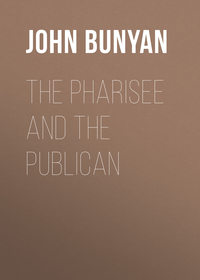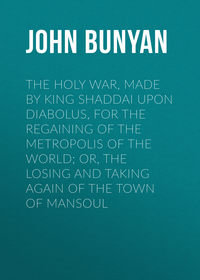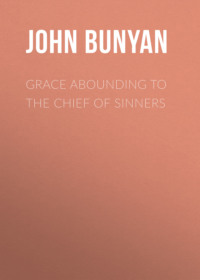
Полная версия
The Pilgrim’s Progress
So I saw that Christian went on his way; yet, at the sight of the old man that sat at the mouth of the cave, he could not tell what to think, especially because he spoke to him, though he could not go after him, saying, “You will never mend till more of you be burned.” But he held his peace, and set a good face on it, and so went by and caught no hurt. Then sang Christian:
“O, world of wonders (I can say no less),
That I should be preserved in that distress
That I have met with here! Oh, blessed be
That hand that from it hath delivered me!
Dangers in darkness, devils, hell, and sin,
Did compass me, while I this vale was in;
Yes, snares, and pits, and traps, and nets did lie
My path about, that worthless, silly I
Might have been catched, entangled, and cast down;
But, since I live, let Jesus wear the crown.”
CHAPTER 5
Now as Christian went on his way, he came to a little ascent which was cast up on purpose that pilgrims might see before them: up there, therefore, Christian went; and looking forward, he saw Faithful before him upon his journey. Then said Christian aloud, “Ho, ho! so-ho! stay, and I will be your companion.” At that Faithful looked behind him; to whom Christian cried, “Stay, stay, till I come up to you.” But Faithful answered, “No, I am upon my life, and the avenger of blood is behind me.”
CHRISTIAN JOINS FAITHFUL
At this Christian was somewhat moved; and putting to all his strength, he quickly got up with Faithful, and did also overrun him: so the last was first. Then did Christian boastfully smile, because he had gotten the start of his brother; but, not taking good heed to his feet, he suddenly stumbled and fell, and could not rise again until Faithful came up to help him.
Then I saw in my dream, they went very lovingly on together, and had sweet talk together of all things that had happened to them in their pilgrimage; and thus Christian began:
CHRIS. My honored and well-beloved brother Faithful, I am glad that I have overtaken you, and that God has so tempered our spirits that we can walk as companions in this so pleasant a path.
FAITH. I had thought, dear friend, to have had your company quite from our town; but you did get the start of me, wherefore I was forced to come thus much of the way alone.
CHRIS. How long did you stay in the City of Destruction before you set out after me on your pilgrimage?
WHAT WAS SAID IN THE CITY
FAITH. Till I could stay no longer; for there was great talk, presently after you were gone out, that our city would, in a short time, with fire from heaven, be burned down to the ground.
CHRIS. What! did your neighbors talk so?
FAITH. Yes, it was for a while in everybody’s mouth.
CHRIS. What! and did no more of them but you come out to escape the danger?
FAITH. Though there was, as I said, a great talk thereabout, yet I do not think they did firmly believe it. For, in the heat of the talking I heard some of them deridingly speak of you, and of your desperate journey; for so they called this your pilgrimage. But I did believe, and do still, that the end of our city will be with fire and brimstone from above; and therefore I have made my escape.
CHRIS. Did you hear no talk of neighbor Pliable?
FAITH. Yes, Christian; I heard that he followed you till he came to the Slough of Despond, where, as some said, he fell in; but he would not be known to have so done; but I am sure he was soundly bedabbled with that kind of dirt.
CHRIS. And what said the neighbors to him?
FAITH. He hath, since his going back, been held greatly in derision, and that among all sorts of people: some do mock and despise him, and scarce any will set him on work. He is now seven times worse than if he had never gone out of the city.
CHRIS. But why should they be set so against him, since they also despise the way that he forsook?
FAITH. “Oh,” they say, “hang him; he is a turncoat! he was not true to his profession!” I think God has stirred up even his enemies to hiss at him and laugh at him, because he hath forsaken the way.
CHRIS. Had you no talk with him before you came out?
FAITH. I met him once in the streets, but he leered away on the other side, as one ashamed of what he had done; so I spake not to him.
CHRIS. Well, at my first setting out, I had hopes of that man, but now I fear he will perish in the overthrow of the city. For it has happened to him according to the true proverb, “The dog is turned to his vomit again, and the sow that was washed to her wallowing in the mire.”
FAITH. These are my fears of him too; but who can hinder that which will be?
CHRIS. “Well, neighbor Faithful,” said Christian, “let us leave him, and talk of things that more immediately concern ourselves. Tell me now what you have met with in the way as you came; for I know you have met with some things, or else it may be writ for a wonder.”
FAITH. I escaped the slough that I perceive you fell into, and got up to the gate without that danger; only I met with one whose name was Wanton, that had like to have done me a mischief.
CHRIS. It was well you escaped her net: Joseph was hard put to it by her, and he escaped her as you did; but it had like to have cost him his life. But what did she do to you?
FAITH. You cannot think (but that you know something) what a flattering tongue she had; she lay at me hard to turn aside with her, promising me all manner of enjoyment.
CHRIS. Nay, she did not promise you the enjoyment of a good conscience.
FAITH. You know what I mean—not the enjoyment of the soul, but of the body.
CHRIS. Thank God you have escaped her: the abhorred of the Lord shall fall into her ditch.
FAITH. Nay, I know not whether I did wholly escape her or no.
CHRIS. Why, I suppose you did not consent to her desires?
FAITH. No, not to defile myself; for I remembered an old writing that I had seen which saith, “Her steps take hold of hell.” So I shut mine eyes, because I would not be bewitched with her looks. Then she railed on me, and I went my way.
CHRIS. Did you meet with no other assault as you came?
FAITHFUL AND ADAM THE FIRST
FAITH. When I came to the foot of the hill called Difficulty, I met with a very aged man, who asked me what I was and whither bound. I told him that I was a pilgrim, going to the Celestial City. Then said the old man, “Thou lookest like an honest fellow: wilt thou be content to dwell with me, for the wages that I shall give thee?” Then I asked him his name, and where he dwelt. He said his name was Adam the First, and that he dwelt in the town of Deceit. I asked him then what was his work, and what the wages that he would give. He told me that his work was many delights; and his wages, that I should be his heir at last. I further asked him what house he kept, and what other servants he had. So he told me that his house was filled with all the dainties of the world, and that his servants were his own children. Then I asked him how many children he had. He said that he had but three daughters, the Lust of the Flesh, the Lust of the Eyes, and the Pride of Life, and that I should marry them if I would. Then I asked, how long time he would have me live with him? And he told me, As long as he lived himself.
CHRIS. Well, and what conclusion came the old man and you to at last?
FAITH. Why, at first I found myself somewhat inclinable to go with the man, for I thought he spake very fair; but looking in his forehead, as I talked with him, I saw there written, “Put off the old man with his deeds.”
CHRIS. And how then?
FAITH. Then it came burning hot into my mind, whatever he said, and however he flattered, when he got home to his house he would sell me for a slave. So I bid him forbear, for I would not come near the door of his house. Then he reviled me, and told me that he would send such a one after me that should make my way bitter to my soul. So I turned to go away from him; but, just as I turned myself to go thence, I felt him take hold of my flesh, and give me such a deadly twitch back, that I thought he had pulled part of me after himself: this made me cry, “O wretched man!” So I went on my way up the hill. Now, when I had got about half-way up, I looked behind me, and saw one coming after me, swift as the wind; so he overtook me just about the place where the settle stands.
CHRIS. “Just there,” said Christian, “did I sit down to rest me; but being overcome with sleep, I there lost this roll out of my bosom.”
FAITH. But, good brother, hear me out. So soon as the man overtook me, he was but a word and a blow; for down he knocked me, and laid me for dead. But, when I was a little come to myself again, I asked him wherefore he served me so. He said, because of my secret inclining to Adam the First. And, with that, he struck me another deadly blow on the breast, and beat me down backwards; so I lay at his feet as dead as before. So, when I came to myself again, I cried him mercy; but he said, “I know not how to show mercy;” and, with that, he knocked me down again. He had doubtless made an end of me, but that One came by, and bid him forbear.
CHRIS. Who was that that bid him forbear?
FAITH. I did not know him at first; but, as He went by, I perceived the holes in His hands and His side; then I concluded that He was our Lord. So I went up the hill.
CHRIS. That man that overtook you was Moses. He spareth none, neither knoweth he how to show mercy to those that disobey his law.
FAITH. I know it very well: it was not the first time that he has met with me. It was he that came to me when I dwelt securely at home, and that told me he would burn my house over my head if I stayed there.
CHRIS. But did not you see the house that stood there, on the top of that hill on the side of which Moses met you?
FAITH. Yes, and the lions too, before I came at it. But, for the lions, I think they were asleep, for it was about noon; and because I had so much of the day before me I passed by the Porter, and came down the hill.
CHRIS. He told me, indeed, that he saw you go by; but I wished you had called at the house, for they would have showed you so many rarities, that you would scarce have forgot them to the day of your death. But pray tell me, did you meet nobody in the Valley of Humility?
FAITH. Yes, I met with one Discontent, who would willingly have persuaded me to go back again with him: his reason was, for that the valley was altogether without honor. He told me, moreover, that there to go was the way to disoblige all my friends, as Pride, Arrogancy, Self-Conceit, Worldly-Glory, with others, who he knew, as he said, would be very much offended if I made such a fool of myself as to wade through this valley.
CHRIS. Well, and how did you answer him?
FAITH. I told him that, although all these that he named might claim kindred of me, and that rightly (for, indeed, they were my relations according to the flesh), yet, since I became a pilgrim, they have disowned me, as I also have rejected them; and therefore they were to me now no more than if they had never been of my lineage. I told him, moreover, that as to this valley, he had quite misrepresented the thing; for before honor is humility, and a haughty spirit before a fall. “Therefore,” said I, “I had rather go through this valley to the honor that was so accounted by the wisest, than choose that which he esteemed most worthy of our affections.”
CHRIS. Met you with nothing else in that valley?
SHAME A BOLD VILLAIN
FAITH. Yes, I met with Shame; but, of all the men that I met with in my pilgrimage, he I think, bears the wrong name. The others would take “No” for an answer, at least after some words of denial; but this bold-faced Shame would never have done.
CHRIS. Why, what did he say to you?
FAITH. What? why, he objected against religion itself. He said it was a pitiful, low, sneaking business for a man to mind religion. He said that a tender conscience was an unmanly thing; and that for a man to watch over his words and ways, so as to tie up himself from that liberty that the brave spirits of the times accustom themselves unto, would make him the ridicule of all the people in our time. He objected also, that but a few of the mighty, rich, or wise were ever of my opinion; nor any of them neither, before they were persuaded to be fools, to venture the loss of all for nobody else knows what. He, moreover, objected the base and low estate and condition of those that were chiefly the pilgrims of the times in which they lived; also their ignorance, and want of understanding in all worldly knowledge. Yea, he did hold me to it at that rate also, about a great many more things than here I relate; as, that it was a shame to sit whining and mourning under a sermon, and a shame to come sighing and groaning home; that it was a shame to ask my neighbor forgiveness for petty faults, or to give back what I had taken from any. He said also that religion made a man grow strange to the great, because of a few vices (which he called by finer names), and because religion made him own and respect the base, who were of the same religious company; “and is not this,” said he, “a shame?”
CHRIS. And what did you say to him?
FAITH. Say? I could not tell what to say at first. Yea, he put me so to it that my blood came up in my face; even this Shame fetched it up, and had almost beat me quite off. But at last I began to consider that that which is highly esteemed among men is had in abomination with God. And I thought again, This Shame tells me what men are, but it tells me nothing what God, or the Word of God is. And I thought, moreover, that at the day of doom we shall not be doomed to death or life according to the spirits of the world, but according to the wisdom and law of the Highest. Therefore, thought I, what God says is best—is best, though all the men in the world are against it. Seeing, then, that God prefers His religion; seeing God prefers a tender conscience; seeing they that make themselves fools for the kingdom of heaven are wisest, and that the poor man that loveth Christ is richer than the greatest man in the world that hates Him; Shame, depart! thou art an enemy to my salvation. Shall I listen to thee against my sovereign Lord? how, then, shall I look Him in the face at His coming? Should I now be ashamed of His way and servants how can I expect the blessing? But, indeed, this Shame was a bold villain: I could scarce shake him out of my company; yea, he would be haunting of me, and continually whispering me in the ear with some one or other of the weak things that attend religion. But at last I told him it was in vain to attempt further in this business; for those things that he despised, in those did I see most glory; and so, at last, I got past this persistent one. And when I had shaken him off, then I began to sing,
“The trials that those men do meet withal,
That are obedient to the heavenly call,
Are manifold, and suited to the flesh,
And come, and come, and come again afresh;
That now, or some time else, we by them may
Be taken, overcome, and cast away.
Oh, let the pilgrims, let the pilgrims then,
Be vigilant and quit themselves like men!”
CHRIS. I am glad, my brother, that thou didst withstand this villain so bravely: for of all, as thou sayest, I think he has the wrong name; for he is so bold as to follow us in the streets, and to attempt to put us to shame before all men; that is, to make us ashamed of that which is good. But, if he was not himself bold, he would never attempt to do as he does. But let us still resist him; for, notwithstanding all his bold words, he promoteth the fool, and none else. “The wise shall inherit glory,” said Solomon; “but shame shall be the promotion of fools.”
FAITH. I think we must cry to Him for help against Shame who would have us to be valiant for truth upon the earth.
CHRIS. You say true. But did you meet nobody else in that valley?
FAITH. No, not I; for I had sunshine all the rest of the way through that, and also through the Valley of the Shadow of Death.
CHRIS. It was well for you! I am sure it fared far otherwise with me. I had for a long season, as soon almost as I entered into that valley, a dreadful combat with that foul fiend Apollyon; yea, I thought verily he would have killed me, especially when he got me down, and crushed me under him, as if he would have crushed me to pieces. For, as he threw me, my sword flew out of my hand; nay, he told me he was sure of me; and I cried to God, and He heard me, and delivered me out of all my troubles. Then I entered into the Valley of the Shadow of Death, and had no light for almost half the way through it. I thought I should have been killed there over and over: but at last day broke, and the sun rose, and I went through that which was behind with far more ease and quiet.
TALKATIVE OVERTAKEN
Moreover, I saw in my dream that, as they went on, Faithful, as he chanced to look on one side, saw a man whose name is Talkative walking at a distance beside them; for in this place there was room enough for them all to walk. He was a tall man, and something better looking at a distance than near at hand. To this man Faithful spoke himself in this manner:
FAITH. Friend, whither away? Are you going to the heavenly country?
TALK. I am going to that same place.
FAITH. That is well; then I hope we may have your good company.
TALK. With a very good will, will I be your companion.
FAITH. Come on, then, and let us go together, and let us spend our time in talking of things that are profitable.
TALK. To talk of things that are good, to me is very acceptable, with you or with any other; and I am glad that I have met with those that incline to so good a work; for, to speak the truth, there are but few who care thus to spend their time as they are in their travels, but choose much rather to be speaking of things to no profit; and this has been a trouble to me.
FAITH. That is, indeed, a thing to be lamented; for what things so worthy of the use of the tongue and mouth of men on earth, as are the things of the God of heaven?
TALK. I like you wonderfully well, for your saying is full of the truth; and I will add, What thing is so pleasant, and what so profitable, as to talk of the things of God? What things so pleasant? that is, if a man hath any delight in things that are wonderful. For instance, if a man doth delight to talk of the history or the mystery of things, or if a man doth love to talk of miracles, wonders, or signs, where shall he find things written so delightful, or so sweetly penned, as in the Holy Scripture?
FAITH. That’s true; but to be profited by such things in our talk should be that which we design.
TALKATIVE SELF-DECEIVED
TALK. That is it that I said; for to talk of such things is most profitable; for, by so doing, a man may get knowledge of many things; as of the folly of earthly things, and the benefit of things above. Besides, by this a man may learn what it is to turn from sin, to believe, to pray, to suffer, or the like; by this, also, a man may learn what are the great promises and comforts of the Gospel, to his own enjoyment. Further, by this a man may learn to answer false opinions, to prove the truth, and also to teach the ignorant.
FAITH. All this is true; and glad am I to hear these things from you.
TALK. Alas! the want of this is the cause that so few understand the need of faith, and the necessity of a work of grace in their soul, in order to eternal life.
FAITH. But, by your leave, heavenly knowledge of these is the gift of God; no man attaineth to them by human working, or only by the talk of them.
TALK. All that I know very well, for a man can receive nothing except it be given him from heaven; I could give you a hundred scriptures for the confirmation of this.
FAITH. “Well, then,” said Faithful, “what is that one thing that we shall at this time found our talk upon?”
TALK. What you will. I will talk of things heavenly or things earthly; things in life or things in the gospel; things sacred or things worldly; things past or things to come; things foreign or things at home; things necessary or things accidental, provided that all be done to our profit.
FAITH. Now did Faithful begin to wonder; and, stepping to Christian (for he walked all this while by himself), he said to him, but softly, “What a brave companion have we got! Surely this man will make a very excellent pilgrim.”
FAITHFUL DISPUTES TALKATIVE
CHRIS. At this Christian modestly smiled, and said, “This man with whom you are so taken will deceive with this tongue of his twenty of them that know him not.”
FAITH. Do you know him, then?
CHRIS. Know him? Yes, better than he knows himself.
FAITH. Pray what is he?
CHRIS. His name is Talkative; he dwelleth in our town. I wonder that you should be a stranger to him: only I consider that our town is large.
FAITH. Whose son is he? and whereabout doth he dwell?
CHRIS. He is the son of one Say-well. He dwelt in Prating Row, and is known to all that are acquainted with him by the name of Talkative of Prating Row; and notwithstanding his fine tongue, he is but a sorry fellow.
FAITH. Well, he seems to be a very pretty man.
CHRIS. That is, to them that have not a thorough acquaintance with him, for he is best abroad; near home he is ugly enough. Your saying that he is a pretty man brings to my mind what I have observed in the work of the painter, whose pictures show best at a distance, but very near more unpleasing.
FAITH. But I am ready to think you do but jest, because you smiled.
CHRIS. God forbid that I should jest (though I smiled) in this matter, or that I should accuse any falsely. I will give you a further discovery of him. This man is for any company, and for any talk. As he talketh now with you, so will he talk when he is on the ale-bench; and the more drink he hath in his crown, the more of these things he hath in his mouth. Religion hath no place in his heart, or house, or conversation: all he hath lieth in his tongue, and his religion is to make a noise therewith.
FAITH. Say you so? Then am I in this man greatly deceived.
CHRIS. Deceived! you may be sure of it. Remember the proverb, “They say, and do not;” but the kingdom of God is not in word, but in power. He talketh of prayer, of turning to God, of faith, and of the new birth; but he knows but only to talk of them. I have been in his family, and have seen him both at home and abroad, and I know what I say of him is the truth. His house is as empty of religion as the white of an egg is of savor. There is there neither prayer nor sign of turning from sin; yea, the brute, in his kind, serves God far better than he. He is the very stain, reproach, and shame of religion to all that know him. It can hardly have a good word in all that end of the town where he dwells, through him. Thus say the common people that know him: “A saint abroad, and a devil at home.” His poor family finds it so: he is such a fault-finder, such a railer at, and so unreasonable with his servants, that they neither know how to do for or speak to him. Men that have any dealings with him say, it is better to deal with a Turk than with him, for fairer dealing they shall have at their hands. This Talkative, if it be possible, will go beyond them, cheat, beguile, and overreach them. Besides, he brings up his sons to follow his steps; and, if he findeth in any of them a foolish timorousness (for so he calls the first appearance of a tender conscience), he calls them fools and blockheads, and by no means will employ them in much, or speak to their commendation before others. For my part, I am of opinion that he has, by his wicked life, caused many to stumble and fall, and will be, if God prevent not, the ruin of many more.









